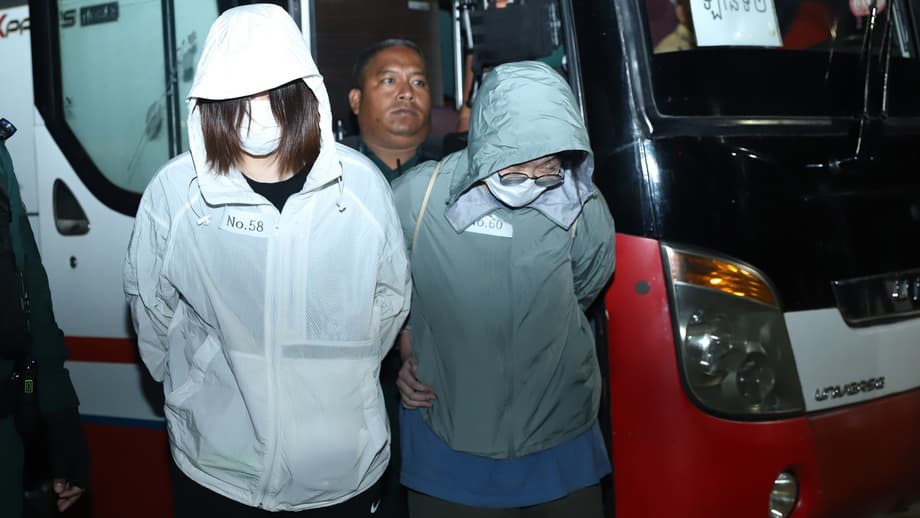Inside South Koreas mass arrests after Cambodia scam flights
South Korea has arrested dozens of its citizens who were flown home from Cambodia after a months long crackdown on transnational online scam operations. A charter flight carrying 64 South Koreans landed at Incheon over the weekend. Police immediately took the group into custody and moved them to local investigative units. Courts have now approved arrest warrants for 49 people, with decisions pending on 10 others, and five released as inquiries continue. Investigators are working to determine who knowingly joined scam outfits and who ended up trapped by traffickers, a distinction that will shape criminal charges and victim protection. Four returnees told police they were beaten while confined in Cambodian scam compounds and forced to work against their will.
- Inside South Koreas mass arrests after Cambodia scam flights
- Who are the suspects and what crimes are alleged
- Coercion, trafficking and claims of abuse
- What South Korea is doing now
- Inside the legal process from flight to courtroom
- Cambodias crackdown and the regional picture
- How people are recruited and trapped
- What to Know
The sweep reflects both a surge in online fraud since the COVID 19 pandemic and rising outrage in South Korea after a 22 year old college student was found dead in Cambodia in August. Authorities in Phnom Penh said he had been tortured. The case focused public attention on a criminal industry that recruits through fake job offers, detains workers with threats of violence, and uses them to target victims around the world. Monitoring groups estimate these schemes generate billions of dollars each year for international crime networks.
The repatriation unfolded with unusually swift coordination. South Korean officials had dispatched a team to Cambodia days earlier for joint action against scam centers. Police then escorted the suspects off the aircraft in handcuffs after landing. Under South Korean law, a national carrier aircraft can be treated as Korean territory, which allowed officers to execute warrants that had been issued in advance and to place suspects under immediate arrest for questioning.
Who are the suspects and what crimes are alleged
Police say the group is linked to a spectrum of frauds that have plagued South Korean communities in recent years. These include voice phishing calls that impersonate officials, romance scams that build false relationships, bogus investment pitches that funnel money into fraudulent platforms, and what authorities describe as no show schemes, in which payments or reservations are collected before culprits vanish. Many of the alleged plots focused on victims in South Korea, although the networks are global.
Investigations have been assigned across regional police units. Cases span activity from late last year through the summer, according to officials. All 64 returnees were tested for drugs and all results were negative, police said. The scope of the probe is large, with digital evidence pulled from devices seized in Cambodia expected to play a central role in mapping roles, chains of command, and money flows.
Cambodian authorities have continued raids on the outskirts of Phnom Penh and across multiple provinces. In one operation they detained 57 additional South Koreans and 29 Chinese nationals, and seized 126 laptops and 30 mobile phones. Officials in Phnom Penh say the effort is part of a broader drive that has raided 92 sites in recent months, detained thousands of people from many countries, and led to formal charges against dozens accused of running or profiting from the compounds.
How pig butchering scams work
One of the most damaging schemes is pig butchering. Scammers spend weeks or months grooming a target online, often through social media or messaging apps. They present themselves as a reliable friend or potential partner, share faux investing insights, and slowly nudge the victim to move money into a platform they control. Once the victim is fully committed, the funds are siphoned away and the contacts disappear. Many of these schemes revolve around cryptocurrency, which allows money to be routed quickly through wallets and mixers that obscure origins and destinations.
Voice phishing remains another major driver of losses. Callers pose as bank staff, tax officials, or police and pressure targets to share account information or transfer funds for supposed emergencies or investigations. The call center infrastructure needed to run this type of fraud can be assembled inside large buildings, with supervisors monitoring scripted calls, fast internet connections, and recruiters funneling in new workers.
Coercion, trafficking and claims of abuse
The surge of cyber fraud has come with a parallel rise in trafficking. United Nations estimates indicate at least 100,000 people have been sent to scam compounds in Cambodia, with a similar number in Myanmar and tens of thousands more in other countries. Many report that they were lured by ads for well paying jobs, had their passports taken on arrival, and were forced to work under threats of beatings or worse. Interpol has also warned that the pool of trafficked workers has expanded beyond Asia, with victims drawn from South America, Western Europe, and Eastern Africa. Investigators have tracked new scam operations to the Middle East, West Africa, and Central America.
Several of the South Korean returnees told police they had been detained and assaulted inside Cambodian compounds. Such statements complicate the criminal investigation. South Korean law punishes fraud and related offenses, but it also recognizes victims of trafficking and forced labor who were compelled to commit crimes. Sorting voluntary participation from coercion will be a central challenge for prosecutors and the courts.
A death that shook South Korea
Public anger intensified after the August killing of a South Korean student in southern Cambodia. He had reportedly been lured by a friend to provide a bank account to a scam operation. Authorities in Cambodia said the victim showed signs of torture. The case helped drive political pressure for a stronger response and more rescues.
South Koreas national security leadership has framed the repatriations as a step toward both accountability and protection. National Security Adviser Wi Sung lac said the group included people who joined willingly and others who were forced. He stressed that a large share of the returnees still face criminal scrutiny.
“Most of them should be regarded as having committed criminal acts,” Wi said.
One lawmaker who has assisted rescue efforts highlighted the desperation that traffickers exploit. Park Chan dae, who helped bring home South Koreans in their twenties and thirties earlier this year, described the social pressures that push some to accept risky offers.
“What is intertwined here is desperate young people with a lack of economic opportunities,” Park said.
What South Korea is doing now
Seoul has rolled out emergency steps to deter travel into known scam corridors and to speed support for citizens in danger. The government issued a code black travel ban for parts of Cambodia after a jump in kidnappings and detentions. A joint task force of diplomats, police, and intelligence officials visited Phnom Penh to coordinate operations, open channels for fast evidence sharing, and set up a system to notify South Korean authorities quickly when nationals are detained. The Foreign Ministry also plans to expand consular staffing to respond to a higher volume of trafficking and missing person cases.
South Korean officials say Cambodian police have recently detained about 10 more South Koreans for suspected scam activity and rescued two people who were being held in compounds. The 12 are expected to be flown home for investigations. Police in Seoul say they will look at each case to determine whether the person was a victim or an offender, and to identify the recruiters and managers behind the fraud rings.
Cambodian leaders have publicly backed closer cooperation with South Korea. Prime Minister Hun Manet summarized the commitment in a social media post after meeting a visiting South Korean delegation.
“Cambodia and the Republic of Korea will continue to strengthen our collaboration to prevent, suppress, and combat online scams more effectively,” Hun Manet said.
The Interior Ministry in Phnom Penh also pointed to closer operational ties. Ministry spokesman Touch Sokhak called the mass return of suspects the product of joint enforcement work against organized fraud.
“The repatriation agreement was the result of good cooperation in suppression of scams,” Touch Sokhak said.
Inside the legal process from flight to courtroom
Once the charter flight touched down in South Korea, police escorted the suspects into custody and began a standard process that balances investigative needs with the rights of the accused. Investigators must lay out reasons for detention to a court, typically risk of flight, danger of evidence destruction, or the seriousness of alleged crimes. Courts have granted arrest warrants for 49 returnees, with more reviews pending. Five people were released, and police have not disclosed details, citing ongoing investigations.
Those held under court warrants will face intensive questioning about recruitment paths, tasks inside the compounds, and contacts up the chain. Prosecutors are likely to consider charges that can include fraud, violations of telecommunications and financial laws, and money laundering. Where evidence supports claims of coercion, authorities may shift to treating the person as a victim of trafficking rather than a suspect. That assessment can include medical exams, communications records, and testimony from other detainees.
Arrests on board the aircraft highlight another facet of jurisdiction. South Korean law allows police to execute warrants on a national carrier aircraft viewed as Korean territory. That practice helped officials prevent suspects from scattering on arrival and safeguarded digital evidence that might otherwise have been wiped during the transfer.
Cambodias crackdown and the regional picture
Cambodia has become one of the key hubs for industrial scale scam centers. Many grew out of business parks and casino districts that shifted into illicit activity during the pandemic. The current crackdown has widened across the country. Authorities say they have searched dozens of sites in 18 provinces and detained thousands of people from many nations. Many detainees were identified as victims of trafficking and deported, while several dozen alleged masterminds have been charged in court.
The latest raids underline how international the problem has become. Police found mixed nationalities inside single compounds, and seized large batches of laptops, smartphones, and scripts. These facilities often run multiple schemes side by side, such as romance investment traps, payment frauds, and corporate impersonation scams. Supervisors enforce quotas, and workers who miss targets can face fines, beatings, or isolation.
Sanctions on a regional crime network
Action is spreading beyond the region. The United States and the United Kingdom announced sanctions against a Cambodia based business network known as Prince Group, alleging it operates scam centers across Southeast Asia and launders proceeds through real estate and other fronts. British authorities have seized properties in London linked to the network. Officials say the groups chair, Chen Zhi, faces charges that include wire fraud and money laundering, and that he remains at large. Such measures aim to choke off financing and send a warning to companies or officials accused of enabling the industry.
The sanctions matter for South Korea, which has seen thousands of citizens targeted by these frauds and hundreds lured to work in the compounds. Hitting the networks financial backbone can limit their reach, complicate recruitment, and help investigators follow money trails back to ringleaders. It also signals that governments are treating cyber enabled trafficking and fraud as a priority for international law enforcement.
How people are recruited and trapped
Recruiters often approach targets on messaging apps or job sites with offers of customer support work, crypto trading jobs, or tech roles with attractive pay. Some victims are asked to pay deposits, surrender their passports for visa processing, or accept travel funded by recruiters. Once in country, passports and phones can be confiscated. Workers are moved to guarded compounds and put under round the clock surveillance. Threats of violence, debt bondage claims, and isolation are used to break resistance.
Families should watch for sudden changes, like a relative traveling on short notice for a job that will not share a clear contract or employer information, or someone asking for money to handle visa fees. Embassies advise against sending scans of passports or transferring funds to unknown recruiters. If someone disappears abroad, relatives should contact police and consular services immediately and gather any messages or location data to support rescue efforts. Lawmakers in Seoul say several rescues succeeded because trapped workers secretly shared live locations.
What to Know
- South Korea arrested 49 of 64 citizens repatriated from Cambodia on suspicion of involvement in online scam operations, with 10 more warrants under court review and five people released.
- Police are investigating whether returnees joined scam networks willingly or were trafficked and forced to work under threats of violence.
- Four of the 64 told investigators they were beaten while held inside Cambodian scam compounds.
- The repatriations followed the August killing of a 22 year old South Korean student in Cambodia that authorities said involved torture.
- Seoul imposed a code black travel ban for parts of Cambodia and launched a joint task force with Phnom Penh to address trafficking and online fraud.
- South Koreas Foreign Ministry says about 1,000 nationals are believed to be in Cambodian scam centers, and Cambodian police have recently detained about 10 more South Koreans and rescued two.
- Cambodia reports raids at 92 sites across 18 provinces, with 57 additional South Koreans and 29 Chinese arrested in a recent operation and large caches of devices seized.
- UN and Interpol assessments point to hundreds of thousands of workers in scam centers worldwide, with victims trafficked from regions far beyond Asia.
- The United States and the United Kingdom announced sanctions on the Cambodia based Prince Group, alleging it runs scam centers and launders proceeds.
- Common frauds include pig butchering romance investment schemes, voice phishing by impostors, and no show deposit scams.












